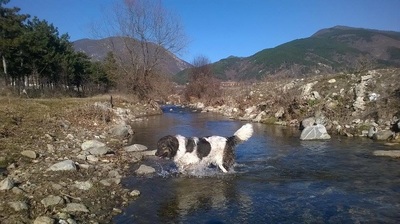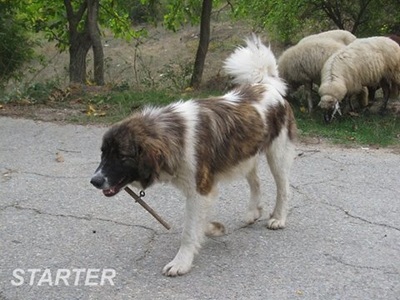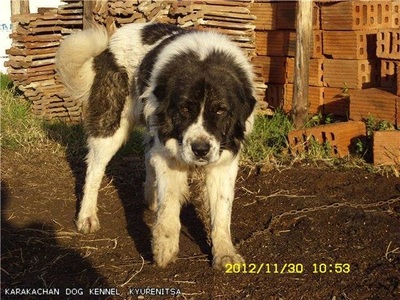>>The American Karakachan Dog Association has appointed a new board. <<
- See 'Board Members' Menu -
- See 'Board Members' Menu -
We provide accurate registrations and information about Karakachan Livestock Guard dogs in the USA. We are honored to work with the International Karakachan Dog Association MAKK of Bulgaria.
Keeping Karakachans true to their history.
HISTORY OF THE BREED
From MAKK in Bulgaria
ON BEHALF OF Karakachan dog's name and the completion of its type Karakachan dog due to Karakachans.According to most scientists Karakachans Hellenized descendants of the Thracians.Their home has become Pindos Mountains, located in the historic district of Epirus, whose name we associate with the great Danes. For them Pliny the Elder wrote that were the strongest dogs much larger than Moson and used to fight lions and elephants. There are various assumptions about the origin of their name. Some say it comes from Kirkacak - "begled the field," according to others from Karakacak - "black fugitive" because of their nomadic lifestyle. Very interesting possibility of interpretations gives an analysis of the language of the ancient Bulgarians made by Prof. Dr. P. Dobrev. He points out that in the lands of the Caucasus Bulgarians occurrences of the word "Karakachans" and it means "wards, a man who lives under an assumed custody." It must be emphasized that before being Hellenized, Karakachans Romanized, ie after the conquest of Thrace by the Roman Empire about 45 gn.e. Thracian population was subjected to ethnic assimilation and the resulting Romanized Thracians were called by the Slavs "power" of staronemskata word ,, "Walh", which were called Romans and which was borrowed from the Slavs and turned into "Vlach". According to Prof. P. Mutafchiev and K. Irechek these Romanized descendants of the Thracians, some of which later merged into the Hellenic ethnic element become nomadic shepherds called by the Slavs "power" and "Koutzo" depending on in which ethnic group are involved - corresponding Romanesque and Hellenic. And until now these wandering livestock were called at home with two names - "Karakachans" and "power." A similar situation with another word - "dog." Although to call their language Slavic, many of the words they use, are ancient Bulgarian origin. For example, in the Pamirs, homeland of the ancient Bulgarians still in Tajik language is the word "kuchuk". In the language cataracts in the Hindu Kush males are called "kuchur" females "kichir." In the language kata also in the Hindu Kush dogs are called "Cujo" and in the Proto area in the Caucasus dogs are called "Kutch" and "guzha" (Dr. P. Dobrev). So now we use ancient Bulgarian word "dog" and Slavonic "mutt." Undoubtedly the advantage however of the ancient word "dog", "bitch", "puppy" compared with the Slavic "mutt" and "shtene." From everything said so far it is clear that if we want to keep the memory of our ancestors, have to respect their will and call it as it was called centuries - Karakachan dog. Finally, it would be foolish oldest breed of sheep, bred by Karakachans, to be called "Karakachan sheep", the oldest type of horse grown on these lands to be called "Karakachan horse" and the oldest type Mountain Dog, created by them to carry a different name.
Author: Zooinzh. Venelin Dinchev
ON BEHALF OF Karakachan dog's name and the completion of its type Karakachan dog due to Karakachans.According to most scientists Karakachans Hellenized descendants of the Thracians.Their home has become Pindos Mountains, located in the historic district of Epirus, whose name we associate with the great Danes. For them Pliny the Elder wrote that were the strongest dogs much larger than Moson and used to fight lions and elephants. There are various assumptions about the origin of their name. Some say it comes from Kirkacak - "begled the field," according to others from Karakacak - "black fugitive" because of their nomadic lifestyle. Very interesting possibility of interpretations gives an analysis of the language of the ancient Bulgarians made by Prof. Dr. P. Dobrev. He points out that in the lands of the Caucasus Bulgarians occurrences of the word "Karakachans" and it means "wards, a man who lives under an assumed custody." It must be emphasized that before being Hellenized, Karakachans Romanized, ie after the conquest of Thrace by the Roman Empire about 45 gn.e. Thracian population was subjected to ethnic assimilation and the resulting Romanized Thracians were called by the Slavs "power" of staronemskata word ,, "Walh", which were called Romans and which was borrowed from the Slavs and turned into "Vlach". According to Prof. P. Mutafchiev and K. Irechek these Romanized descendants of the Thracians, some of which later merged into the Hellenic ethnic element become nomadic shepherds called by the Slavs "power" and "Koutzo" depending on in which ethnic group are involved - corresponding Romanesque and Hellenic. And until now these wandering livestock were called at home with two names - "Karakachans" and "power." A similar situation with another word - "dog." Although to call their language Slavic, many of the words they use, are ancient Bulgarian origin. For example, in the Pamirs, homeland of the ancient Bulgarians still in Tajik language is the word "kuchuk". In the language cataracts in the Hindu Kush males are called "kuchur" females "kichir." In the language kata also in the Hindu Kush dogs are called "Cujo" and in the Proto area in the Caucasus dogs are called "Kutch" and "guzha" (Dr. P. Dobrev). So now we use ancient Bulgarian word "dog" and Slavonic "mutt." Undoubtedly the advantage however of the ancient word "dog", "bitch", "puppy" compared with the Slavic "mutt" and "shtene." From everything said so far it is clear that if we want to keep the memory of our ancestors, have to respect their will and call it as it was called centuries - Karakachan dog. Finally, it would be foolish oldest breed of sheep, bred by Karakachans, to be called "Karakachan sheep", the oldest type of horse grown on these lands to be called "Karakachan horse" and the oldest type Mountain Dog, created by them to carry a different name.
Author: Zooinzh. Venelin Dinchev
Karakachans in their home country of Bulgaria
Importation to the USA
In 2004, Dr. D. Phillip Sponenberg DVM, PHD imported the first Karakachans into the United States of America.
More info coming.
More info coming.


